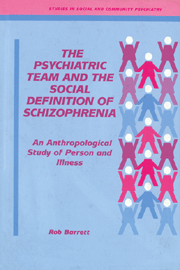 The Psychiatric Team and the Social Definition of Schizophrenia
The Psychiatric Team and the Social Definition of Schizophrenia Published online by Cambridge University Press: 05 August 2016
Ridgehaven Hospital is a state psychiatric hospital in an Australian city. In 1980 one division, or ‘Team’, of the hospital was designated exclusively for the treatment of schizophrenia. This book is a study of the ‘Schizophrenia Team’, the clinical staff who worked on it, and the patients they treated. Its purpose is to develop a contextual understanding of schizophrenia by studying a clinical setting in which this disorder was experienced, diagnosed, and treated.
At the time of the study, Ridgehaven Hospital was widely regarded as a modern public psychiatric hospital that had very high standards of practice, the first such hospital to be accredited by the Australian Council of Hospital Standards. There was an esprit among the staff. This book is thus a study of hospital psychiatry at its best, not a critique of a custodial backwater. It is an opportunity to examine the place of modernity and progress in psychiatric treatment.
The book focuses first on the clinical staff of the hospital, who were members of different professions but worked together in teams when treating patients. It looks at three core professions—psychiatry, psychiatric nursing, and social work —comparing the different perspectives their members employed in their individual therapeutic work and when acting in concert as part of a treatment team. My purpose is to examine how the professions were organized in relation to each other within a psychiatric hospital, and how this organization influenced the way clinical staff approached patients and constructed them as cases of psychiatric illness.
Two of the basic tools of clinical work are writing and talking. The second part of this book looks at how the staff of Ridgehaven wrote and talked about their patients. It concentrates on assessment interviews and the ways in which these interviews were documented in case records, tracing the transformations that occurred from spoken dialogue to written record. I compare these written accounts of patients with the way staff members spoke to each other about their patients—that is, with what could be said but never written in the record. This section of the book poses a number of questions: What consequences do such basic clinical processes as diagnosis and treatment have for a person? What transformations are achieved in a person's experience and identity when he or she engages with an expert team of talking, writing professionals?
To save this book to your Kindle, first ensure [email protected] is added to your Approved Personal Document E-mail List under your Personal Document Settings on the Manage Your Content and Devices page of your Amazon account. Then enter the ‘name’ part of your Kindle email address below. Find out more about saving to your Kindle.
Note you can select to save to either the @free.kindle.com or @kindle.com variations. ‘@free.kindle.com’ emails are free but can only be saved to your device when it is connected to wi-fi. ‘@kindle.com’ emails can be delivered even when you are not connected to wi-fi, but note that service fees apply.
Find out more about the Kindle Personal Document Service.
To save content items to your account, please confirm that you agree to abide by our usage policies. If this is the first time you use this feature, you will be asked to authorise Cambridge Core to connect with your account. Find out more about saving content to Dropbox.
To save content items to your account, please confirm that you agree to abide by our usage policies. If this is the first time you use this feature, you will be asked to authorise Cambridge Core to connect with your account. Find out more about saving content to Google Drive.